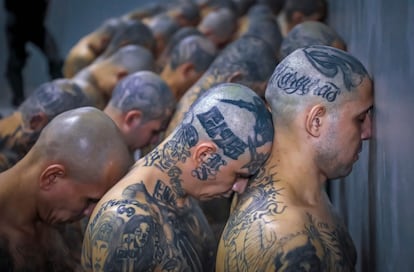Bukele shows off thousands of imprisoned gang members in new mega prison
The president assures that the prisoners ‘will live for decades’ in the immense prison built as part of his controversial security strategy, where they will not be able to do ‘any more harm to the population’


The staging is impressive. The cameras focus on hundreds of men who, dressed only in white underwear, leave prisons across El Salvador to be transferred by bus to what is the flagship project of President Nayib Bukele’s security policy: the Center for the Confinement of Terrorism, a huge prison complex located on the outskirts of San Salvador and which the president heralded as “the largest prison in all of America.”
It was Bukele himself who shared the video that shows how last Friday morning imprisoned gang members were taken from their cells by guards, handcuffed and forced to walk with their bodies bent over. In the recording, the men board buses and are taken to the new maximum security prison, where they have been locked up, in a display of power against the so-called maras. “This will be their new house, where they will live for decades, mixed, without doing any more harm to the population,” the Salvadoran president said.
The video begins with the men running with their hands on their heads, their faces bewildered, listening to the guards’ orders. The gang members sit in an enormous prison courtyard, one pressed against the other, until the cellblock fills up. All together, they make up a shocking image: a huge mass of human bodies, of shirtless men with shaved heads and tattooed arms and backs. Once everyone has come down from their cells, the men are ordered to run in a single file line to the buses, with their hands handcuffed behind their backs.
The number of cameras used is surprising. They’re everywhere: in the old prisons, inside the buses, on the road that connects the city with the gigantic confinement center. There are aerial shots and close-ups of the prisoners’ faces in the dead of night. And finally, with the arrival of dawn, there is a shot of the prison, dramatically illuminated by the first rays of the sun. To Bukele, this mega prison serves a symbol for the country’s hopes of security.

“They tell me that I am brave because we are facing terrorists, drug traffickers, international organizations, major world powers, the local oligarchy,” Bukele said. “And maybe I am brave compared to the parasites who governed [El Salvador] before, compared to politicians from other countries who must be just as parasitic,” the president said in a video in which he gives a speech to the armed forces. “I am not as brave as the soldiers, the police, as those who risk their lives day after day to bring peace to the Salvadoran people and who really face terrorism, crime and evil face to face,” he added.
The transfer of 2,000 gang members to the maximum security prison in just seven months has generated a new wave of criticism from human rights organizations, which question the legality of the measures taken by the president since he declared a state of emergency in El Salvador as part of his security strategy. Since the decree, more than 60,000 gang members have been arrested, but along the way authorities have committed serious human rights violations. A report presented at the end of January by Human Rights Watch (HRW) revealed that “large-scale abuses” have been committed against the detainees and within the country’s prisons, including extreme overcrowding, violations of due process, lack of guarantees, mass arrests and deaths in custody. “Thousands of people, including hundreds of children, have been arrested and charged with broadly defined crimes that violate detainees’ basic due process guarantees and undermine prospects of justice for victims of gang violence”, the agency denounced in its report.
The transfer of the gang members coincides with an indictment filed by the US Attorney’s Office in a New York Federal Court, which accuses two senior officials within the president’s administration of having negotiated with the gangs a reduction in homicides in exchange for benefits, between 2019 and 2021. The document, made public last Thursday by the Department of Justice, revealed that the Salvadoran government negotiated for at least two years with the gangs to slash the numbers of homicides in El Salvador, in order to drive up Bukele’s popularity – who, in fact, continues to have high approval ratings. The president has not commented on the US justice system’s accusations, although he spent the weekend retweeting messages praising the prison transfer.
“This highly cinematic [prisoner] transfer comes after the Department of Justice released an indictment that points to the government having negotiated with the gangs. This transfer is intended to try to control the narrative and convey a strongman figure,” explained Juan Pappier, acting deputy director of HRW’s Americas division. “Bukele has developed a model of repression and shady negotiations with the gangs behind the backs of the Salvadoran people,” he added. Regarding the huge prison complex, Pappier said that “this prison is a symbol of Bukele’s punitive security policies that will allow him to maintain his very high popularity ratings, but I have no doubts that in the long term there will be no more security for Salvadorans. [Past] experiences in El Salvador show that these types of measures, if they are not accompanied by good policies that address structural problems, fail to curb the rates of violence.”
The Salvadoran leader, however, boasts of having lowered his country’s high homicide rates in 10 months. In his account of how his personal crusade against the gangs has played out, Bukele has celebrated a drastic drop in crime in January and February and has dubbed his country “the safest in America.” On Sunday, he said El Salvador completed (“thank God”) another full week without homicides. The strategy is applauded by most Salvadorans, and it appears that the staging of the prisoner transfer has helped the president’s image. “This is a government that flaunts its human rights violations. Of course, those who commit serious crimes must be brought to justice, but what we see here is a security policy designed for the popularity of the president and at the expense of human rights,” said Pappier, from HRW.
Sign up for our weekly newsletter to get more English-language news coverage from EL PAÍS USA Edition
Tu suscripción se está usando en otro dispositivo
¿Quieres añadir otro usuario a tu suscripción?
Si continúas leyendo en este dispositivo, no se podrá leer en el otro.
FlechaTu suscripción se está usando en otro dispositivo y solo puedes acceder a EL PAÍS desde un dispositivo a la vez.
Si quieres compartir tu cuenta, cambia tu suscripción a la modalidad Premium, así podrás añadir otro usuario. Cada uno accederá con su propia cuenta de email, lo que os permitirá personalizar vuestra experiencia en EL PAÍS.
¿Tienes una suscripción de empresa? Accede aquí para contratar más cuentas.
En el caso de no saber quién está usando tu cuenta, te recomendamos cambiar tu contraseña aquí.
Si decides continuar compartiendo tu cuenta, este mensaje se mostrará en tu dispositivo y en el de la otra persona que está usando tu cuenta de forma indefinida, afectando a tu experiencia de lectura. Puedes consultar aquí los términos y condiciones de la suscripción digital.








































